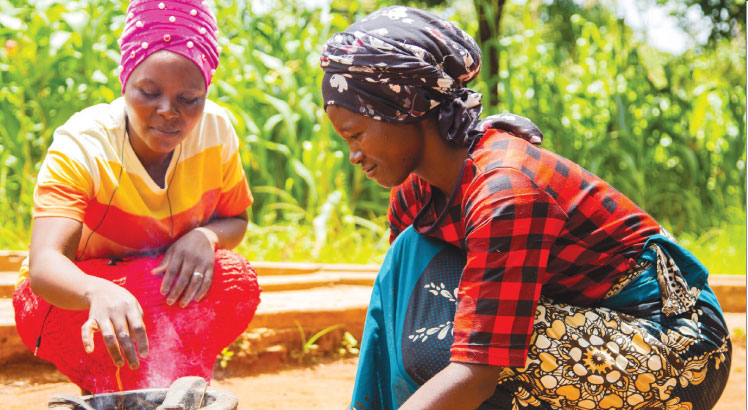Long walks to fetch firewood and water haunted Chilunga villagers in Zomba District.
Edna Chimbalanga and her two daughters climbed Zomba Mountain almost every day to get fuelwood and water for home use.
“As trees vanished, the walks lengthened and rivers such as Lifani, Nchilikano, Kasoto and Mifumu started drying up. This forced us to turn to the mountain,” she recalls.
Chimbalanga says lengthy uphill trips limited her time to take care of her family and do income generating activities.
She recounts: “We had to wake up by 3am for the girls to fill our water buckets before setting off to fetch firewood in the mountain. The tiring task took almost 10 hours.”
The United Nations (UN) estimates that an average Malawian woman spends 54 minutes fetching water amid the global push for Sustainable Development Goal (SDG) six to provide access to safe and affordable drinking water for all by 2030.
The global goal envisages everyone getting the vital utility within a 30-minute round trip.
Mercy Makwinja, from the rural locality under Traditional Malemia, says the long walks used to deprive children, especially girls, their right to education.
“They returned home tired around 11am and usually went to school late and too tired to learn. Many dropped out of school, leaving them at risk of early pregnancies and marriages,” she states.

Village head Chilunga says the appetite for firewood and reluctance to plant trees left Malosa Natural Forest Reserve bare.
“Due to poverty and hunger, encroachers and some people cut trees to burn charcoal and create new farmlands,” he says.
At least nine in every 10 households in Malawi use firewood and charcoal for cooking, according to the 2018 Census.
Minama Village Natural Resources Management Committee was established in 2009 to restore a 2 000-hectare degraded landscape on Malosa Mountain.
Chilunga says the landscape restoration initiative got a boost in 2020 when the UN Development Programme (UNDP) rolled out the Transformational Adaptation for Climate Resilience Project.
They embarked on integrated land restoration and watershed management activities to enhance their resilience and adaptation to climate change.
Chimbalanga, the committee secretary, says the initiative empowered the rural community to tackle environmental degradation.
They evicted 11 encroachers who destroyed a 17.4 hectare forest in the mountain.
She says: “We stopped opening new fields on the slopes and started replanting trees and promoting natural regeneration of tree stumps and shrubs.
Within two years, the long trips to fetch fuel wood and water had become history.
Women say they now have more time to take care of their families and children go to school on time.
“Firewood and water are available right in the village, so we have more time for income-generating initiatives,” Chimbalanga says.
Chilunga adds that there is peace in many homes where men once suspected their long-disappearing wives of promiscuity.
UNDP, with funding from the Japanese Supplementary Budget (JSB), is promoting activities to combat climate change, including clean energy and sustainable land use.
The locals received about 2 000 energy-efficient cookstoves known as Chitetezo Mbaula to lessen pressure on re-emerging trees.
Users say the handmade stoves consumes less firewood than smoky open fireplaces.
“We cook food with just two or three sticks and it emits less smoke than open fires,” says Makwinja.
Just like that, the technology saves trees and human health while allowing forests to become green again.
The forests now play home to 90 beehives for beekeeping.
The proceeds of honey sales show the benefit of conserving forests, says Chimbalanga. “When we sell our honey, the income helps about 63 households to get basic needs.”
The forest protectors have formed a village savings and loans group where they get soft business loans.
Yayileka Jackson, 34, borrowed a K100 000 to open a shop and buy farm inputs.
“This has increased my household income for my family of six,” he says.
Jackson also pays K40 000 his son’s fees at Msanjama Private Secondary School.
Zomba-Malosa forestry assistant officer Getrude Manyoni says the green interventions complement the Forestry Department’s efforts to restore the country’s green cover.
She says: “Now communities understand the importance of conserving the environment. They lead in the implementation of activities. This assures us of the sustainability of interventions.”
UNDP Malawi resident representative Shigeki Komatsubara says the UN agency wants to contribute to Malawi’s zero-emission and climate-resilient development.
He says: “The support is in line with Malawi’s Nationally Determined Contributions in energy and agriculture sectors as well as building community resilience through climate adaptation and implementing mitigation actions to reduce greenhouse gases for a green economy.”
Source: The Nation_Monday, March 27, 2023_by Temwa Mhone-Correspondent
